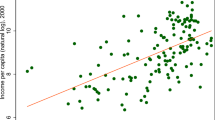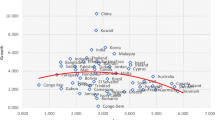Abstract
This article studies the political economy of inequality and growth by combining the political economy approach with an imperfect capital market assumption. In the present model, there emerges a class of individuals whose members do not invest privately beyond the state-financed schooling, due to their initial wealth constraint. We show that inequality affects private investment not only through the political effect, which relates inequality to private investment negatively, but also through what we call the threshold effect, which associates inequality to private investment positively. In general, private investment and inequality do not show a monotone negative relationship.
Similar content being viewed by others
References
Aghion, P., and P. Bolton. (1992). “Distribution and Growth in Models of Imperfect Capital Markets.” European Economic Review 36, 603–611.
Aghion, P., and P. Bolton. (1996). “A Theory of Trickle-Down Growth and Development.” Working paper, Delta, Paris. Forthcoming in Review of Economic Studies.
Aitchison, J., and J. Brown. (1969). The Lognormal Distribution. Cambridge: Cambridge University Press.
Alesina, A., and D. Rodrik. (1992). “Distribution, Political Conflict, and Economic Growth.” In A. Cukierman, Z. Hercowitz, and L. Leiderman (eds.), Political Economy, Growth, and Business Cycles. Cambridge, MA: MIT Press.
Alesina, A., and D. Rodrik. (1994). “Distributive Politics and Economic Growth.” Quarterly Journal of Economics 109, 465–490.
Banerjee, A., and A. Newman. (1991). “Risk-Bearing and the Theory of Income Distribution.” Review of Economic Studies 58, 211–235.
Bénabou, R. (1995). “Unequal Societies.” Working paper, New York University.
Bénabou, R. (1996). “Inequality and Growth.” In B. Bernanke and J. Rotemberg (eds.), NBER Macroeconomics Annual. Cambridge, MA: MIT Press.
Deininger, K., and L. Squire. (1996a). “Does Inequality Matter? Re-examining the Links Between Growth and Inequality.” Working paper, World Bank.
Deininger, K., and L. Squire. (1996b). “New Ways of Looking at Old Issues: Inequality and Growth.” Working paper, World Bank.
Galor, O., and J. Zeira. (1993). “Income Distribution and Macroeconomics.” Review of Economic Studies 60, 35–52.
Glomm, G., and B. Ravikumar. (1992). “PublicVersus Private Investment in Human Capital: Endogenous Growth and Income Inequality.” Journal of Political Economy 100(4), 818–834.
Kroll, Y., and H. Levy. (1980). “Stochastic Dominance: A Review and Some New Evidence.” Research in Finance 2, 163–227.
Levy, H. (1973). “Stochastic Dominance Among Log-Normal Prospects.” International Economic Review 14(3): 601–614.
Loury, G. (1981). “Intergenerational Transfers and the Distribution of Earnings.” Econometrica 49, 843–867.
Meltzer, A., and S. Richard. (1981). “A Rational Theory of the Size of the Government.” Journal of Political Economy 89(5), 914–927.
Perotti, R. (1993). “Political Equilibrium, Income Distribution, and Growth.” Review of Economic Studies 60, 755–776.
Perotti, R. (1994a). “Fiscal Policy and Growth: An Empirical Investigation.” Working paper, Columbia University.
Perotti, R. (1994b). “Income Distribution and Investment.” European Economic Review 38, 827–835.
Persson, T., and G. Tabellini. (1992). “Growth, Distribution and Politics.” European Economic Review 36, 593–602.
Persson, T., and G. Tabellini. (1994). “Is Inequality Harmful for Growth?” American Economic Review 84, 600–621.
Roemer, J. (1997). “Why the Poor Do Not Expropriate the Rich in Democracies: An Old Argument in New Garb.” Working paper, University of California, Davis. Forthcoming in Journal of Public Economics.
Rothschild, M., and J. Stiglitz. (1970). “Increasing Risk I: A Definition.” Journal of Economic Theory 2, 225–243.
Saint-Paul, G., and T. Verdier. (1992). “Education, Democracy, and Growth.” Working paper, Delta, Paris.
Saint-Paul, G., and T. Verdier. (1993). “Education, Democracy, and Growth.” Journal of Development Economics 42, 399–407.
Saint-Paul, G., and T. Verdier. (1996). “Inequality, Redistribution and Growth: A Challenge to the Conventional Political Economy Approach.” European Economic Review 40, 719–728.
Verdier, T. (1994). “Models of Political Economy of Growth: A Short Survey.” European Economic Review 38, 757–763.
Rights and permissions
About this article
Cite this article
Lee, W., Roemer, J.E. Income Distribution, Redistributive Politics, and Economic Growth. Journal of Economic Growth 3, 217–240 (1998). https://doi.org/10.1023/A:1009762720862
Issue Date:
DOI: https://doi.org/10.1023/A:1009762720862




